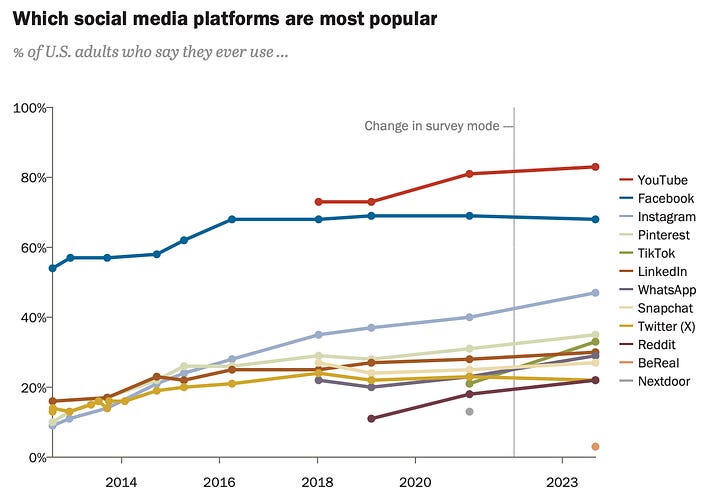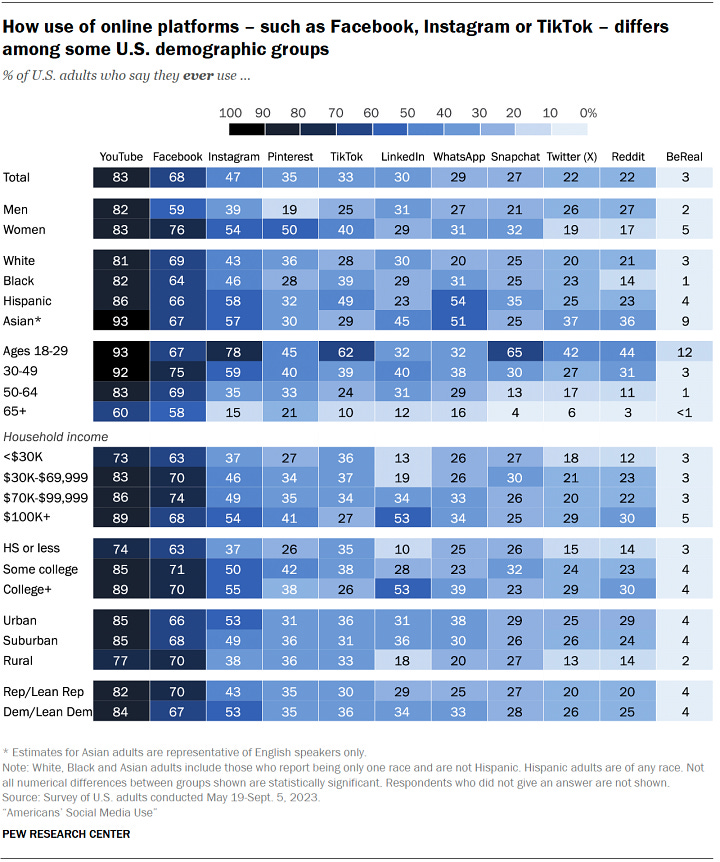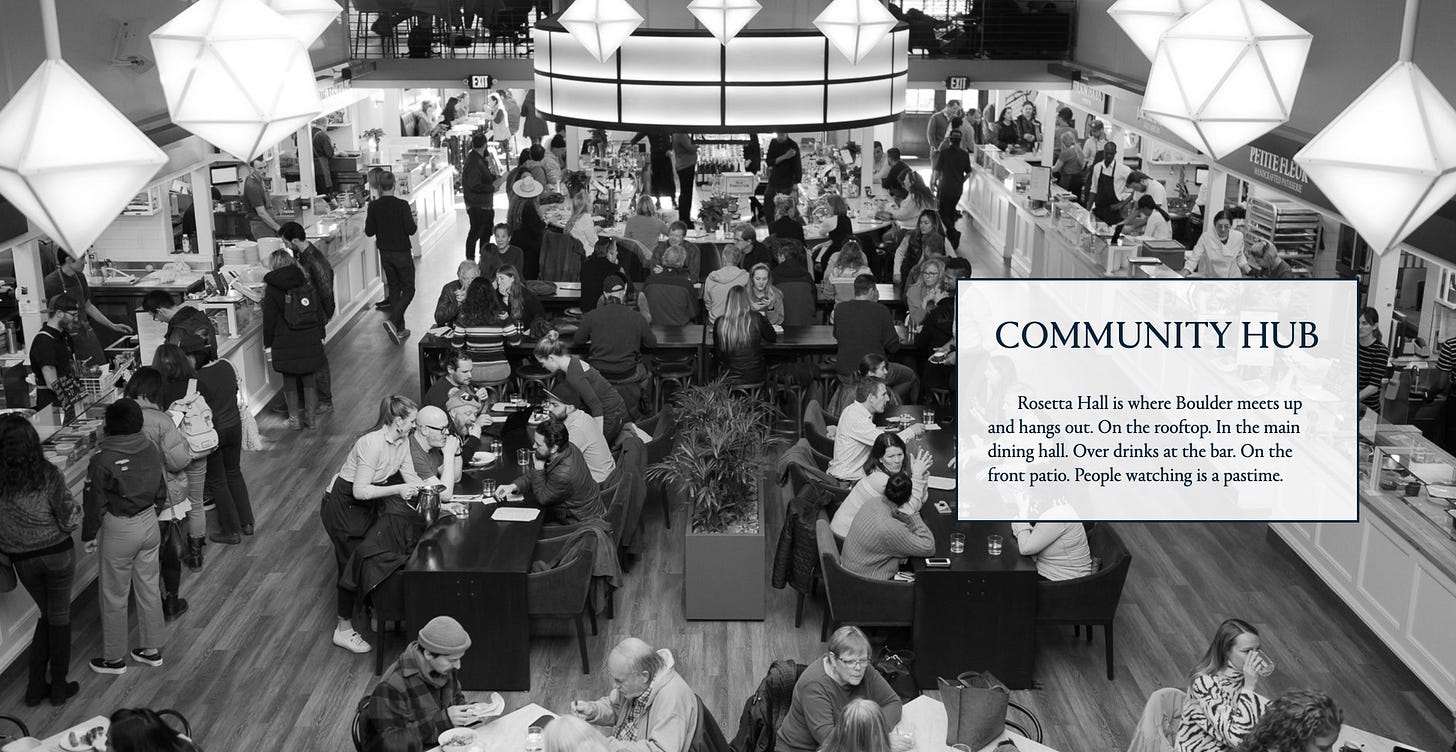Dear Friends,
I have been writing online for over 20 years. But why? Has it made me happier? Wiser? Has it brought opportunities? Friendships? Or is it a habit, a way to pass time, like watching a sitcom or going for a walk? Or worse, is it a compulsion like a donut or second cup of coffee — something irresistible and detrimental?
On Saturday afternoon, I ordered a spiced chai at Boulder’s Trident Bookstore, which I first discovered in 1998.1 In walked
. I didn’t know his age, where he was from, where he worked, or much about him at all. And yet, from having followed his Substack over the past several months, I felt that I understood him on a deeper level. We quickly fell into the kind of meaningful conversation usually built upon years of friendship.I asked him where he met
, another writer on Substack. I had assumed it was high school or college. But no, a friend of Michael’s recommended Rish’s Substack and eventually they met at a show in Austin.And so I told Michael about Elena, a flirtatious and quick-witted intellectual from New York City whose blog I followed in the mid-2000s. One day, she emailed me to say she was visiting family in San Diego and I offered to pick her up at the airport. She arrived in an electric wheelchair and disclosed with a smile that she has cerebral palsy. It was a gift to meet Elena’s flirtatious, witty mind before I focused on all the ways her body failed to keep up.
During our weekend exploring my favorite (handicapped accessible) spots in San Diego, Elena and I discussed why we write and our shared aspirations to publish a novel. I wish we had also discussed what it would be like to be a writer in 2024 compared to 2004.
Three chapters of the internet
Last December marked 20 years of writing online.2 I wanted to publish a reflection about how the internet has changed over the past two decades, and how it changed me. It went something like this:
The golden age: 2003-2009 — Connecting with fellow writers across the world, contributing to Wikipedia and open source software projects, creating podcasts with friends, learning photography on Flickr, flirting on instant messenger — all without the dopamine-hit-addiction of smartphones, dating apps, and social media. In other words, all of the upsides of the internet without the downsides.
The iPhone, decline of blogs, and rise of social media & streaming: 2010 - 2022 — Then came 2010, when everything started to change. My writer friends stopped publishing personal essays to spend more time on Facebook, Twitter, Instagram, and Netflix.3 Apple added a front-facing camera to the iPhone and soon I saw more pictures of people’s faces than what they observed. Anyway, you already know this story.4
The pandemic, the rise of Substack, ChatGPT: 2022 - ? — Are we at the cusp of a new chapter? It’s tempting to think so but impossible to know except in hindsight. It feels like a new era. It feels like we hit a saturation point during the pandemic, and most of us now seek a better balance. More time reading and writing, less time scrolling. More time in nature, less time streaming. More time with humans, less time with algorithms.
But while Substack brings back a pinch of unrushed curiosity and human connection, OpenAI and its competitors will surely define the new chapter in ways we can’t yet predict. Will AI free us from screen time to enjoy more time offline? Or will it sucker us into consuming even more manipulative marketing as we relieve our loneliness by chatting with robots?
In other words, will computers better adapt to humans? Or will humans keep adapting to computers?
Why we write
Michael and I decamped from Trident Bookstore and walked over to Rosetta Hall, a major upgrade from 1990s food courts. Rarely one to suffer from indecision, I struggled to choose between the mouthwatering options … food from nearly every corner of the world. We ended up both ordering the pad thai and a cold Mexican lager.
We talked about why we write, and what it has taught us.
Writing is hard. But running a 10k is hard too. In both cases, we build up slowly, celebrate small gains, and avoid comparing ourselves to professionals. Writing gives us the confidence to express ourselves clearly — and the modesty from witnessing inconsistencies flow from our fingers.
Good writing stirs emotions.5 At our best, we distinguish the substance of our readers’ responses from the emotions we stirred in them. At our best, writing makes us courageous without becoming unkind.
Does writing make us sad?
Why do many writers suffer from depression? Three of Substack’s most productive and successful writers —
, , and Freddie deBoer — have written at length about their struggles with depression. Freddie, in particular, links the financial success of his Substack ($300,000 per year in paid subscriptions) to the harm it has inflicted on his mental health.6So, does writing make us sad? Or are depressed people more likely to write?
There are dozens of research studies on the effects of writing on mood and well-being. Thanks to Perplexity and Consensus, I have acess to summaries of them all. Most writing improves our mood and well-being, including physical health. But some writing can darken our mood, especially if we’re prone to rumination, perfectionism, or hypersensitivity to criticism.
That tracks with my experience. While I haven’t suffered from depression, I’ve learned to focus my writing on what makes me happy and curious, not what annoys me. I’ve let go of perfectionism; I now see grammatical mistakes and typos as markings of artisan craft. And 20 years of writing in public have given me a masterclass in dealing with criticism; I can appreciate the substance of criticism without feeling personally attacked. 🤗
Writing in 2044
It was already 8:30 pm and I needed to drive back to Denver. As we gathered our things, Michael brought up the rhetorical device of my Substack: observations about the 2020s for an audience in the 2040s. I asked how he envisions his life in 20 years. Back in Denver, preparing for sleep, I jotted down his response in my journal and set a reminder to revisit in 2044.
What about me? Will I still be writing in public in 2044, when I’m 64 years old? And if so, why — because writing is a gift, a habit, or a compulsion?
I think it began as a compulsion, a way to understand my mind and process the world around me. It became a habit. And that habit has given me many gifts.
I hope that in 20 years, I am still reading Michael’s reflections and trip reports. I hope that a reminder pops up on my computer (or smart glasses or brain-computer interface or whatever) and I send him a message.
The many gifts of writing in public
Roughly 18 years ago, I stumbled upon the blog of Nathan Gibbs. He had recently moved from Tijuana to San Diego, where he worked at the local NPR station. He scored free tickets to a Beth Orton concert and offered me one … an unlikely first date for two dudes in San Diego.
Our lives have taken many unexpected turns over the past 18 years. After a long stint in Texas, he’s back in San Diego, a journalism professor now with five kids. In November, we’ll meet in Nayarit, Mexico to compete in a triathlon.
Writing in public has given me many gifts: self-awareness, confidence, humility, memories, and a good number of friends, fellow seekers, who weave in and out of this Long Strange Trip. If you’re reading this, you’re one of them. I appreciate you and hope that we’ll keep crossing paths.
As an 18-year-old who recently fled Southern California’s suburbs, Boulder, Colorado had a mythical status. I had just read Kerouac’s Denver adventures in On The Road and my high school girlfriend described Boulder’s Naropa Institute as a Buddhist version of Hogwarts School of Witchcraft and Wizardry, where the misfits and bohemians who felt out of place in the suburbs would find solidarity and meaning at the foothills of the Front Range Mountains.
Much like in December 2003, I was once again driving/moving from California to Mexico.
When Pew Research first started tracking the use of social media in their annual surveys back in 2005, just 5% of American adults had used social media. By 2011, it was 50%. Today it is 72% — a number that is growing among users 50 and older and declining for everyone else. Of the 8 billion people on Earth, more than 3 billion now use a Facebook platform.


Here’s how Substack co-founder Hamish McKenzie described what many of us are now fleeing:
The modern internet is conspiring against our better instincts. It wants to feed us continuous dopamine hits, and we keep accepting its offer. On Twitter, we find world-weary witticisms and thrilling take-downs. On TikTok, we get sucked into short videos of sexy dances and people using gym socks to cook chicken sous vide. On YouTube, there’s always one more SHOCKING and ELECTRIFYING moment that will CHANGE YOUR LIFE. On Facebook, your worst uncle is ranting about the apocalypse. On Instagram, there’s a viral meme cross-posted from TikTok.
In person, we lean toward agreeableness. In our writing, we lean toward description and argumentation.
Freddie’s reflection has its contradictions. He also writes, “For the record, people constantly suggest that my writing skills are a benefit of my mental illness, but that is a type of romanticized nonsense I have no time for.”







I love the irony in you mentioning the use of AI for efficiency and then just a few paragraphs later using AI to speed up your research process. I think that's a key indicator of how the writing/reading process is evolving, forcing a shift in this culture. Good writing does stir emotion, but as we lean into metrics and social trends, the line between emotion and engagement blurs.
It's refreshing to hear you say that it's been 20 years of writing - I have respect for such consistency. I think that's the toughest thing to overcome in this era of writing; we get attached to these creative outlets and then let them pass all too quickly. And I mean this as a barrier for folks who don't write full-time or pocket 300k from paid subscriptions. Power to those folks, but consistency looks a bit different there.
For others, it's the constant bat-swings of other creative and lifely endeavors in order to stay on the bike they're currently riding. And you've done that for the past 20 years and I'm truly looking forward to reading the next 20 years of your words and will try my damn best to keep up with you.
"Good writing stirs emotions. At our best, we distinguish the substance of our readers’ responses from the emotions we stirred in them. At our best, writing makes us courageous without becoming unkind."
This reminds me of the Tolstoy essay (https://home.csulb.edu/~jvancamp/361r14.html) that I mentioned at dinner, "What Is Art?":
"Art is a human activity consisting in this, that one man consciously, by means of certain external signs, hands on to others feelings he has lived through, and that other people are infected by these feelings and also experience them. Art is not, as the metaphysicians say, the manifestation of some mysterious idea of beauty or God; it is not, as the aesthetical physiologists say, a game in which man lets off his excess of stored-up energy; it is not the expression of man's emotions by external signs; it is not the production of pleasing objects; and, above all, it is not pleasure; but it is a means of union among men, joining them together in the same feelings."
Tolstoy goes on to note that the infectiousness of a piece of art--how easily it infects the consumer of art with the feelings of its creator--determines its quality.
Your curiosity about what the future holds in the next twenty years has definitely taken root in my mind. I owe you, and myself, a better and more developed answer to that question.